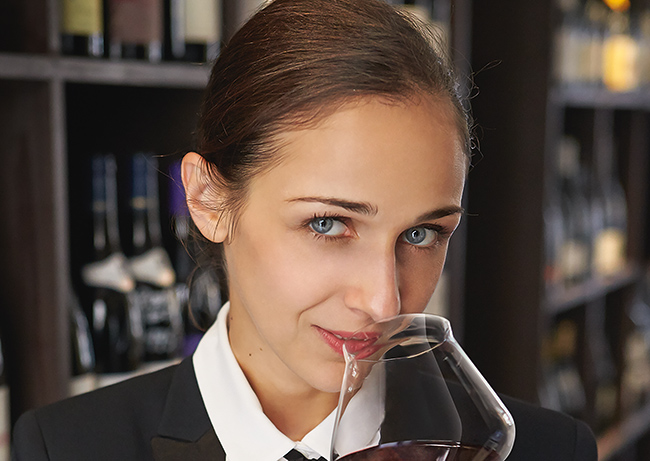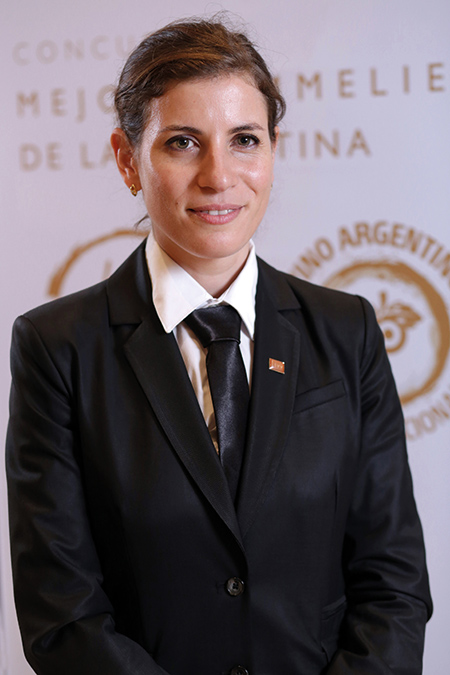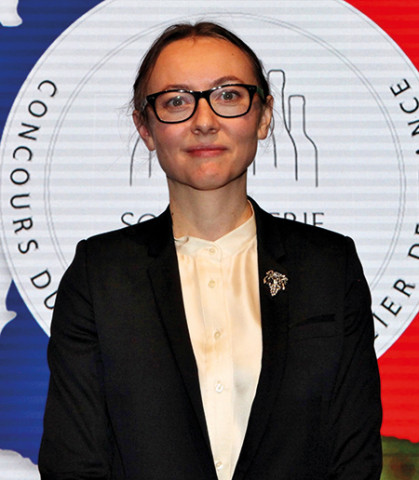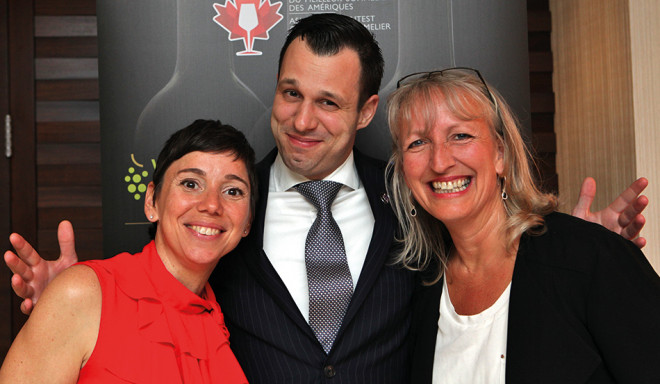More and more women sommeliers are practising this fascinating profession, holding the keys to prestigious cellars around the world. Self-assured, they excel in sommelier competitions and form a community that many others could envy. Women I love us!

She is nicknamed «the palate of the Republic» because she is at the head of the cellar of the Elysée Palace. Virginie Routis, after the Bristol, has been monitoring and orchestrating the 14,000 bottles of the French Presidency since 2007. The Ritz reopened its doors in Paris in 2015 and it is a woman, Estelle Touzet, who took the helm of a team of six sommeliers responsible for 140,000 nectars. In New York at Le Bernardin and NoMad, the wine service is a women’s business. In Argentina, a mecca for women sommeliers, the national competition launched in 2002 has always been won by women (except in 2017) - the latest being Valeria Gamper - and the country’s first sommelier school was created by Maria Barrutia. Paz Levinson, who has a prestigious list of awards, trained there; when she was appointed in 2018 to the Anne-Sophie Pic group, she was the first woman chef sommelier of a three-star restaurant.

At the helm then, but it is difficult to give their number per country. Within Association de la Sommellerie Internationale (ASI), women are the majority in Korea and Finland (52%) and not far from parity in certain regions of South America, Asia or Northern Europe - 35% in Japan, 30% in France, 21% in the Netherlands - and still poorly represented in Central Europe, Morocco or Cyprus. These figures are on the rise, all the more so as there are more and more girls in training, and not only in France where sommelier schools (more than 40) have more than 50% girls among their students. Arnaud Chambost - sommelier teacher at the François Rabelais Hotel and apprentice school in Dardilly and Best Craftsman of France (MOF) Sommelier 2000 - started out in 2002 with classes almost entirely composed of boys; in 2020, there will be many female students asking to specialise in this promising profession. They are curious, efficient, dynamic and very involved in their studies, probably more than their male counterparts, he admits. Charlotte Guyot was one of his students two years ago. Not very confident but passionate and hard working, she won the title of Best Young Sommelier of France in 2018, the first female victory in this trophy created in 2009. At the age of 25, she is now assistant chef sommelier at the restaurant Le 1920 at Four Seasons in Megève after Mère Brazier (Lyon). A great start for Charlotte who has just entered the competition for the Best Sommelier of France 2020.

Another young female talent, Nina Jensen, 26 years old. She started competing in 2016 and three years later she won the silver medal at the last Best Sommelier of the World (BSOW) competition behind Marc Almert. Nina is, with another young prodigy Estonian Ketri Leis, in the line of her peers from Northern Europe and of those women sommeliers who, in the 1990s, opened the way for women sommeliers from Sweden. Though for Nina, men and women have the same practice of the profession, each with their own style, the difference lies between those who compete and those who don’t, with one key word: determination. Romanian Julia Scavo, 35 years old, has already achieved three top 12 finishes in the last BSOW competitions after beginning competing at the age of 24. Passionate about dance, theatre and lyrical singing, Julia, who dares to compare her practice of the profession with her Ingres violins, entered the race to learn more and more, to push her limits, to find the right balance between technique and personality and thus stay on top. She has just won the “Gérard Basset Memorial Prize” which rewards the top score in Unit 3 of the DipWSET.
A husband coach, a dining room for training place, hundreds of hours of research and study, physical training and daily mental preparation, this is the preparation program of the French-Irish Julie Dupouy for the world competition that she has run three times. And may the best one win!

Yet it has not always been easy to be a woman in a profession long thought to be the preserve of men. Philippe Faure-Brac, president of UDSF, tells us that in his Parisian restaurant (Le Bistrot du Sommelier) in the 1990s, he had to “struggle” with certain customers to impose that the wine list should be presented to them by a woman. And he quotes with some emotion the French pioneers of the profession: Danièle Carré Cartal, the first woman Best Sommelier of France in 1978, and Maryse Allarousse, then 53 years old, in the semi-final with him at the 1992 BSOW competition in Rio which he won. They are examples for a whole generation of young women who dare to become sommeliers and establish themselves in an environment with a very “macho” reputation.
Still according to Philippe Faure-Brac, “girls have a strength of analysis and emotional power of transmission when they talk about a wine that boys rarely have”. Anne-Sophie Pic evokes “this feminine vision of wine” when she talks about Paz Levinson, her chef sommelier who is also a writer and poet. Sophie Mirande is the first female UDSF Maître Sommelier in Corsica and has just been elected president of the regional association. Men and women, she says, have a different sensitivity to tasting and a different relationship to words when it comes to describing a wine or an alcohol. A woman “sells dreams through emotion”, a boy will stay more technical.
For Pascaline Lepeltier, a philosophy graduate with a historic double victory in the two French competitions (MOF and Best Sommelier of France) in 2018, since wine is also an art of language, she still needs to work on her oratory and semantic skills; an asset for her profession and in competitions.
But Pascaline points out a trend: in 2020, in New York where she works, the approach to wine is no longer a question of debate between men and women but of generation. The Millennial professionals are breaking the codes linked to the wines of their elders in the cradle city of the #MeToo movement and in a market where socio-ethics increasingly influences purchases.
All of these fighters, whether they are already on the international competition circuit or in the process of becoming one, when questioned, evoke the importance of their elders, inspiration and mentors. For Pascaline, they are Canada’s “top sommeliers”, Véronique Dalle, Elyse Lambert and Véronique Rivest. Julie Dupouy trained with Paz Levinson while Michèle Chantôme, Secretary General of ASI, who knows them all, says that in the 2000s women from all over the world were beginning to tackle the international podiums driven by the performances of their predecessors. An example: the Swiss Myriam Broggi who multiplied the places of semi-finalist at the Ruinart Trophies for the Best Sommelier of Europe and at the world competitions since 1988 and finished in 1994 as the first woman to climb on the podium of the European competition. Canadian Véronique Rivest has competed in three BSOW competitions; she, who never goes anywhere without her “suitcase full of books”, came very close to winning the title in 2013 carried by an entire country that followed her exploit live on social networks. Then, on the eve of her 50th birthday, she decided to hang up her competition apron so that she could finally devote herself to other projects and discover the pleasure of coaching the younger ones. Paz Levinson spent a month with her before the 2016 BSOW competition and contacts are already established with Pascaline Lepeltier for the future.

Although there are still (too) few women entering the international competition, there were only eight candidates out of sixty-six at the 2019 World Cup and we already know that France will not be presenting any girls at the Europe Competition next November. Let’s bet that this new decade will be feminine! The youngest ones like Ketri Leis, Nina Jensen or the 22-year-old Dayana Nassyrova (Kazakhstan) are already on the starting blocks. As for the older ones, nothing says that we won’t see them on the podiums again ... Who will be the next Best Sommelier of the World in 2022 in Paris?
Valérie Massot Germe